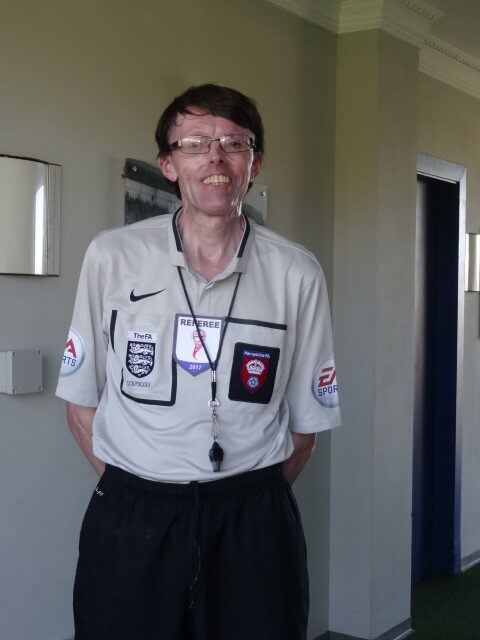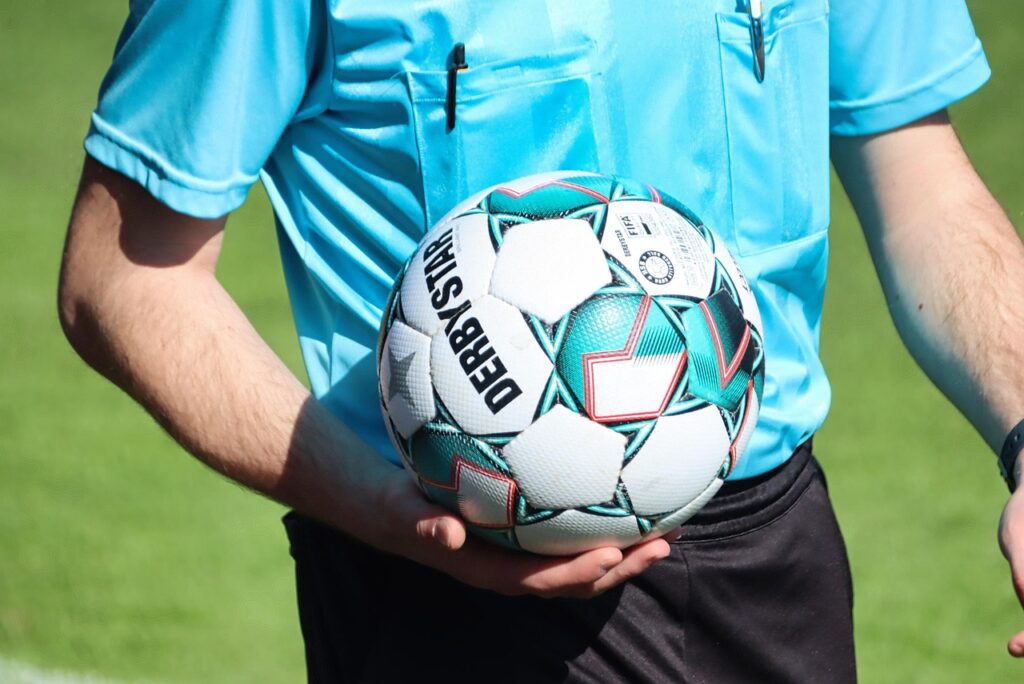Making a good impression is important.

A HELPING HAND
We have all been in situations where we are grateful for having someone with us to guide and encourage us, back us up and help us achieve a particular task. We all know how important it is for us to have that support and the huge difference it can make to our confidence going forward.
This is particularly relevant in refereeing, because we can start refereeing whilst still in our teens! We are thrust into a position of some responsibility:
-being in charge of a large group of people, including adults
-convincing people that we know what we are doing
-making decisions that we have to stick with under pressure
-maintaining order before, during and after a match
-acting as a role model for everyone at the match, players, managers, coaches and spectators.
I’m sure was very nervous when I arrived at the venue of my first game, even though I was 31 at the time. I’m sure the match was chosen for me by the appointments secretary as one a brand new referee would be able to cope with. I don’t remember where the match took place, which teams were involved or how it went. I don’t remember whether there was someone there, an experienced colleague perhaps, to mentor and support me. I am sure that having someone there would have been very reassuring.
Now imagine being put in that situation as a teenager! You’re probably still playing in a team yourself and you’re not that much older than the players whose match you are now in charge of. You may have never had a leadership role. You are used to doing what you are told by adults, such as your parents or teachers. Now here you are telling them what to do. A daunting challenge indeed.
If your mum or dad is unable to stay and watch, who can you turn to for support? Who can you trust to be neutral? Who can help you get through the game and keep your spirits up?

At a youth tournament in Portugal. I enjoyed working with my colleagues at the event. We were all mentoring-helping each other and learning by sharing our knowledge and experience.
A REFEREE MENTOR
He or she can make a huge difference just by being there. Ideally you will have spoken to your mentor on the phone some days before the game, so you know they’re coming. You know they are there to help you and you know they want you to succeed. You also know what is expected of you:
-where the match is taking place
-when to be at the venue
-what checks you should carry out before you allow the match to start
-what you should be wearing and the equipment you will need
PREPARATION IS KEY
Can you see how important all this is? How useful it can be to have this information before a ball has been kicked? You now have a clear plan. Now it’s up to you to look after yourself, relax and get plenty of sleep the night before your game.
Your mentor will have benefitted from that initial contact too; they know a bit about you-your age and experience, your personality and your feelings about today’s game. They know what you think your strengths and weaknesses are. They know what you want them to focus on.
GETTING YOU THROUGH THE DAY
You meet your mentor at the agreed time. You’re looking very smart in your referee kit; your mentor also looks the part. You go through the plan and you have the chance to ask questions. You’ll get some tips on how to convince everyone you’re sure of your decisions even if, deep down, you may have doubts. You go through your instructions for today’s club assistants. You now understand that you are in charge.
You check the pitch, the corner flags and the goal nets, removing any hazards you find or marking them so you can ask the host club to deal with them for you before kick-off.
You go through a warm-up routine and a few stretches. The players and club officials start to arrive.
You and your mentor introduce yourselves to the team managers: you check the players’ equipment, telling them to remove anything they should not be wearing.
You ask the managers to nominate someone to act as a club assistant for you. You then brief both club assistants together. You demonstrate the signals you want them to use to help you.

Then it’s time for kick-off! Your mentor moves to the touchline; all he or she can do during play is encourage you quietly and discreetly. You call the captains to the centre spot for the coin toss. You shake their hands and wish them and their teams well for the game. Yes, you really are in charge now. You check that the players-especially the goalkeepers-and your assistants are ready.
The match begins. You’re running around the pitch, keeping up with play and anticipating where the ball is going to go. Your whistle is loud and your signals and voice are clear. You make eye contact with your club assistants and acknowledge their signals. This helps to ensure the three of you are working happily and efficiently as a team. You have to pretend your mentor isn’t there but there’s no harm in making occasional eye contact with them too.
The first half is over in no time and you leave the pitch for a drink and a chat with your mentor. He or she asks you what you think went well and what you think you could change to make things even better. You’ll be given examples of both from specific incidents in the game. These are development points for you to take into the second half.
You are more confident in the second half, which goes by faster than the first. Soon you are blowing the full-time whistle and shaking hands with everyone involved as you leave the pitch. You have another chat with your mentor to reflect on the second half and the game as a whole. Your mentor will send you a full report on the game later on.
And that’s all there is to it!
GLOWING FEEDBACK
‘We have never had a character like him before, and he was brilliant in speaking to the players both before AND after the match which, despite our 10 players losing 9-3 was an excellent sporting game…
The referee maintained perfect control, placed himself ideally and helped ensure all the children enjoyed a smooth and flowing game of football. At U11s age with the players relatively new to 11-a-side rules, he even helped them learn by explaining clearly the rules when a penalty had to be taken-unfortunately against my team, but accepted well by them.
As my adult assistant was new to the job, the ref even took time to explain carefully what was expected before kick-off and this helped ensure we now have another helper who will be confident to do the job for us again.’


These comments come from a youth team manager’s message to his league appointments secretary after a match I refereed. Such praise is rare and therefore extremely gratifying. It also demonstrates the positive impact a referee can have on everyone involved in a match. It is your job as a mentor to help create the conditions in which such words can become reality.
CONSTRUCTIVE FEEDBACK-YOUR MENTOR’S REPORT
The Sovereign FA. Referee Development Form
| Name of Referee/Mentee | |||
| Match/Event | v | ||
| Competition | |||
| Venue | |||
| Date | |||
A Development Area
| 1 |
Your Strength Areas
| 1 | |
| 2 | |
| 3 |
Additional Comments
| Name of Referee Mentor | |
| Signature | |
| Date |
This is an example of what your report might look like. As you can see, the layout is clear and simple. It allows the mentor to pass on key points from the game, giving examples for each one; it avoids overloading the recipient with too much information. This benefits both mentor and mentee by providing clear and specific guidance for future reference. This information can also be shared with your appointments secretaries to keep them informed of the referee’s progress.
CONCLUSION
I know from personal experience just how important mentoring is for referees. I have seen it from several different viewpoints-as a team helper, coach and manager, then as a referee myself. I know how much I gained from having someone there to offer me support and guidance when I became a referee. I am very grateful to everyone who helped me over the years. Thanks to them, as I gained in confidence and experience, refereeing became something I really looked forward to doing every week. It seemed only right that I should pass that knowledge on to others, so I became a mentor as well. Seeing the colleagues I worked with grow in confidence, develop their skills, succeed and enjoy themselves gave me an enormous sense of satisfaction.
Mentoring, in short, can make a huge difference to referees’ confidence and their enjoyment of the game. It can help referees understand their role and what they have to do before, during and after matches. It can give them detailed, specific and constructive feedback that helps them develop their skills and keeps them in the role for longer. It helps appointments secretaries choose the right matches for their officials and keep track of their progress. And it helps the game by sustaining and hopefully enlarging the number of confident, capable people who are willing to get involved.

Leave a Reply